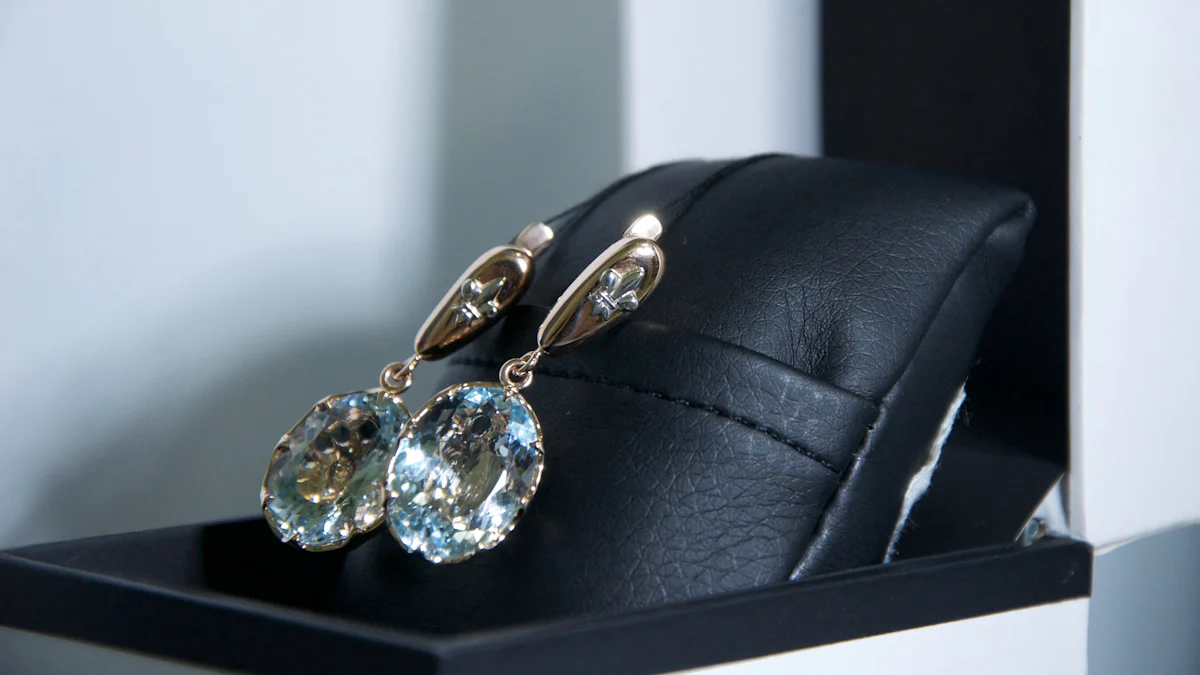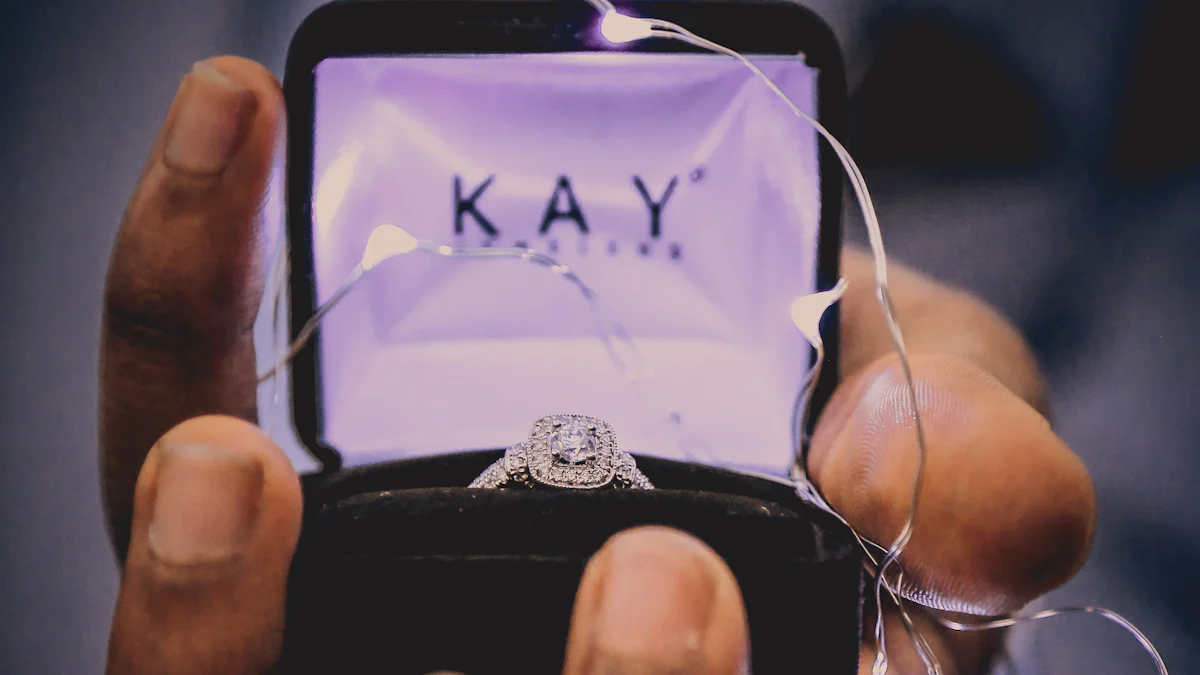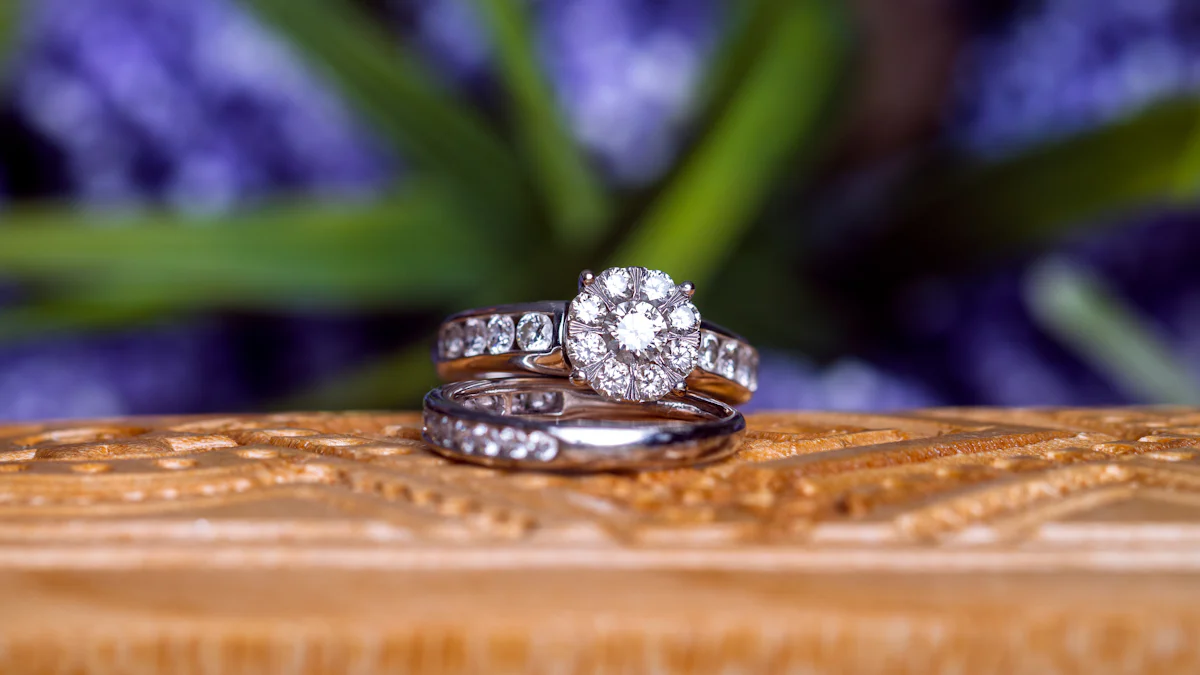2.00ct Diamond Prices Compared Across Top Retailers

The price of a 2.00ct diamond can vary widely, offering options for every budget. Lab-grown diamonds start as low as $1,300, while high-quality natural diamonds can exceed $22,000. Online retailers like Blue Nile and Clean Origin often provide competitive pricing, making them a popular choice for savvy shoppers. On the other hand, luxury brands such as Tiffany & Co. cater to those seeking exclusivity and premium craftsmanship. Understanding factors like quality, certification, and retailer type helps you make smarter decisions and find the best value for your investment.
Key Takeaways
- Understand the price range for 2.00ct diamonds: lab-grown options start around $1,300, while natural diamonds can exceed $22,000.
- Online retailers like Blue Nile and James Allen often offer better prices and a wider selection compared to brick-and-mortar stores.
- Always check for diamond certification from reputable organizations like GIA to ensure quality and authenticity.
- Consider lab-grown diamonds for a more budget-friendly option without sacrificing quality; they can be 30-40% cheaper than natural diamonds.
- Take advantage of sales events and promotions, especially during holidays, to find significant discounts on diamonds.
- Evaluate the retailer's reputation and customer service; trusted brands often provide better warranties and return policies.
- Don't hesitate to negotiate prices in-store; many jewelers are open to discussions, especially for high-value purchases.
Overview of Retailers
When shopping for a 2.00ct diamond, the choice of retailer can make a big difference in price, selection, and overall experience. Let’s explore the two main types of retailers: online stores and brick-and-mortar shops.
Online Retailers
Examples of popular online retailers for 2.00ct diamonds
Online retailers have revolutionized the diamond-buying process. Companies like Blue Nile and James Allen stand out for their extensive inventory and competitive pricing. Blue Nile, one of the largest online jewelry sellers, offers a vast selection of diamonds with high-quality images to help you make an informed decision. James Allen, another top contender, is known for its 360-degree HD videos of diamonds, allowing you to inspect every detail before purchasing. These platforms often provide lab-grown and natural diamonds, giving you a wide range of options to suit your budget.
Benefits of purchasing diamonds online
Buying diamonds online comes with several advantages. First, online retailers typically have lower overhead costs, which means they can offer better prices compared to physical stores. You’ll also enjoy the convenience of browsing from home, with no pressure from salespeople. Many online stores, like Blue Nile, provide free shipping and hassle-free return policies, making the process even more appealing. Additionally, online platforms often feature customer reviews and detailed product descriptions, helping you feel confident in your purchase.
Brick-and-Mortar Stores
Examples of well-known physical retailers
For those who prefer a more traditional shopping experience, brick-and-mortar stores remain a popular choice. Retailers like Kay Jewelers, Jared The Galleria Of Jewelry, and Zales are household names in the U.S., known for their wide selection and excellent customer service. In cities like Los Angeles, stores such as Beverly Hills Jewelers offer a personalized touch, including custom designs and appraisals, ensuring you leave with a piece that feels truly special.
Advantages of in-store purchases
Shopping in person allows you to see and feel the diamond before buying. This hands-on experience can be invaluable, especially if you’re new to diamond shopping. Brick-and-mortar stores often provide personalized assistance, helping you understand the nuances of cut, clarity, and color. Many physical retailers also offer services like resizing, repairs, and warranties, giving you peace of mind. If you value face-to-face interaction and expert guidance, visiting a store might be the right choice for you.
Price Comparison Table

Comparing Prices Across Retailers
When it comes to buying a 2.00ct diamond, prices can vary dramatically depending on the retailer and the diamond's characteristics. To help you navigate these differences, here's a breakdown of price ranges across popular retailers.
| Retailer | Price Range | Cut | Clarity | Setting Options | |------------------------|-------------------------|---------------|---------------|---------------------------| | Blue Nile | $6,000 - $29,000 | Excellent | VS2 - SI1 | Solitaire, Halo, Pave | | James Allen | $5,800 - $28,500 | Ideal | VS1 - SI2 | Classic, Vintage, Modern | | Clean Origin | $4,200 - $15,000 | Very Good | VS2 - SI1 | Lab-Grown, Customizable | | Tiffany & Co. | $20,000 - $51,000 | Excellent | VVS1 - VS1 | Premium, Designer Styles | | Kay Jewelers | $7,000 - $25,000 | Good | SI1 - SI2 | Traditional, Customizable |
Note: Prices reflect a range based on the 4 Cs (cut, clarity, color, and carat) and may vary depending on promotions or additional features like settings and certifications.
Details included: cut, clarity, setting, and price range
The table above highlights key details that influence pricing. For example, diamonds with an "Excellent" cut and higher clarity grades, such as VS1 or VVS1, tend to command premium prices. Retailers like Tiffany & Co. focus on offering top-tier quality, which explains their higher price range. On the other hand, online retailers like Clean Origin provide more affordable options, especially for lab-grown diamonds, without compromising on clarity or cut.
Key Observations from the Table
Retailers with the most affordable options
If you're shopping on a budget, online retailers like Clean Origin and James Allen stand out. Clean Origin offers lab-grown diamonds starting at $4,200, making it a great choice for cost-conscious buyers. James Allen provides a wide selection of natural diamonds with competitive pricing, starting at $5,800. Both retailers also offer flexible setting options, allowing you to customize your ring without breaking the bank.
Retailers with premium pricing and their unique offerings
For those seeking luxury and exclusivity, Tiffany & Co. is unmatched. Their diamonds, priced between $20,000 and $51,000, are known for exceptional craftsmanship and iconic settings. The brand's reputation for quality and its signature designs make it a favorite among premium buyers. Similarly, Blue Nile offers high-quality diamonds with excellent cuts and clarity, catering to buyers who want a balance of quality and value.
Factors Influencing Price Differences

When shopping for a 2.00ct diamond, you’ll notice that prices can vary significantly. Several factors contribute to these differences, and understanding them can help you make a smarter purchase.
Diamond Quality
Impact of cut, clarity, color, and carat on price
The 4 Cs—cut, clarity, color, and carat—play a major role in determining a diamond’s price. Among these, the cut often has the most significant impact. A well-cut diamond reflects light beautifully, making it more brilliant and valuable. For example, round diamonds are typically more expensive than Asscher cuts, which can cost 15% to 25% less due to their simpler design.
Diamonds with fewer inclusions and blemishes are more desirable, often commanding higher prices.
Carat weight is another key factor. Larger diamonds are rarer, so their price increases exponentially with size. However, two diamonds with the same carat weight can differ in price by as much as 70% due to differences in cut quality or other gemological factors.
Certification and its role in pricing
A diamond’s certification acts as its “report card.” Reliable certifications, such as those from the Gemological Institute of America (GIA), ensure that the diamond’s quality has been accurately assessed. Certified diamonds often cost more, but they provide peace of mind. Without certification, you risk overpaying for a stone that doesn’t meet the claimed standards.
Pro Tip: Always ask for a diamond’s certification before purchasing. It’s your best guarantee of quality and value.
Retailer Type
Online vs. in-store pricing differences
Where you buy your diamond matters. Online retailers often offer lower prices because they don’t have the overhead costs of physical stores. For instance, a 2.00ct diamond from an online retailer like Clean Origin might cost $4,200, while a similar diamond at a brick-and-mortar store could be priced much higher. Online platforms also provide tools like 360-degree views, helping you evaluate diamonds from the comfort of your home.
In contrast, physical stores offer a hands-on experience. You can see the diamond in person and get personalized advice. However, this convenience usually comes with a higher price tag.
Brand reputation and its influence on cost
A retailer’s reputation can significantly impact pricing. Luxury brands like Tiffany & Co. charge premium prices for their diamonds, often due to their iconic designs and exceptional craftsmanship. While these diamonds are undoubtedly high-quality, part of what you’re paying for is the brand name. On the other hand, lesser-known retailers may offer similar quality at a fraction of the cost.
Additional Costs
Customization and setting options
The diamond itself isn’t the only expense. Customization options, such as unique settings or engravings, can add to the overall cost. For example, a simple solitaire setting is more affordable than intricate halo or pave designs. If you’re looking for a personalized touch, be prepared to pay extra.
Warranties, insurance, and other add-ons
Additional services like warranties and insurance can also influence the final price. Many retailers offer extended warranties or maintenance plans, which cover resizing, cleaning, or repairs. While these add-ons provide peace of mind, they can increase your total cost. Make sure to factor these into your budget when comparing prices.
Quick Tip: Always read the fine print on warranties and insurance policies. Knowing what’s covered can save you money in the long run.
Value for Money
Finding the perfect 2.00ct diamond doesn’t have to break the bank, nor does it mean compromising on quality. Whether you’re a budget-conscious buyer or someone seeking luxury, understanding where to shop can help you get the best value for your money.
Best Retailers for Budget Buyers
Retailers offering competitive prices without compromising quality
If you’re looking for a 2.00ct diamond that fits your budget, online retailers like Clean Origin and James Allen are excellent options. Clean Origin specializes in lab-grown diamonds, which are often 30-40% more affordable than natural diamonds. Their diamonds maintain high standards of cut and clarity, ensuring you get a stunning piece without overspending. James Allen, on the other hand, offers a wide selection of natural diamonds at competitive prices. Their user-friendly platform allows you to compare diamonds side by side, making it easier to find the best deal.
Brick-and-mortar stores like Kay Jewelers and Zales also cater to budget buyers. These retailers frequently run promotions and offer financing options, making it easier to afford a high-quality diamond. While their prices may not always match online retailers, their in-store services, such as resizing and cleaning, add extra value.
Pro Tip: Always check for certifications like GIA or AGS when shopping for diamonds. Certified diamonds ensure you’re getting what you pay for, even at a lower price point.
Tips for finding discounts and promotions
Scoring a great deal on a diamond often comes down to timing and research. Here are some tips to help you save:
- Shop during sales events: Major holidays like Black Friday, Valentine’s Day, and Christmas often bring significant discounts. Some retailers offer up to 50% off during these periods.
- Sign up for newsletters: Many retailers, including Blue Nile and James Allen, provide exclusive discounts to subscribers. Signing up can give you early access to sales and promotions.
- Negotiate in-store: If you’re shopping at a physical store, don’t hesitate to ask for a better price. Many jewelers are willing to negotiate, especially if you’re purchasing a high-value item. Consider lab-grown diamonds: These diamonds offer the same brilliance as natural ones but at a fraction of the cost.
Best Retailers for Premium Buyers
Retailers known for high-end diamonds and luxury settings
For those who prioritize craftsmanship and exclusivity, luxury retailers like Tiffany & Co. and Harry Winston set the gold standard. Tiffany & Co. is renowned for its exceptional quality and iconic designs. Their diamonds undergo rigorous grading processes, ensuring only the finest stones make it to their collections. Harry Winston, often referred to as the “King of Diamonds,” offers unparalleled luxury with bespoke settings and rare gemstones.
Online platforms like Blue Nile also cater to premium buyers. While they offer a range of price points, their high-end collections feature diamonds with excellent cuts and top-tier clarity grades. Blue Nile’s customization options allow you to create a one-of-a-kind piece, perfect for marking special occasions.
Expert Insight: According to diamond industry professionals, selecting a jeweler with a strong reputation ensures you’re investing in a diamond that holds its value over time. Brands like Tiffany & Co. often include buy-back or upgrade policies, adding long-term value to your purchase.
Why premium buyers may prefer certain brands
Premium buyers often gravitate toward brands with a legacy of excellence. These brands offer more than just diamonds; they provide an experience. For instance, Tiffany & Co. includes its signature blue box with every purchase, symbolizing elegance and prestige. Their diamonds also come with lifetime warranties and complimentary services like cleaning and resizing.
Luxury brands also emphasize ethical sourcing. Many high-end retailers, including Brilliant Earth, focus on conflict-free diamonds and sustainable practices. This commitment to ethics resonates with buyers who value transparency and responsibility.
Quick Tip: When shopping for luxury diamonds, ask about additional perks like warranties, upgrade programs, and exclusive designs. These extras can enhance the overall value of your investment.
The price of a 2.00ct diamond depends on factors like quality, retailer type, and whether it’s lab-grown or natural. Online retailers often offer better value, especially for budget-conscious buyers, while luxury brands cater to those seeking exclusivity and premium craftsmanship. To make a smart purchase, focus on comparing certifications to ensure authenticity, look for promotions to save money, and evaluate the retailer’s reputation for reliability. By understanding these elements, you can confidently choose a diamond that fits your needs and budget.
FAQ
What are the differences between natural and lab-grown diamond prices?
Lab-grown diamonds offer a more budget-friendly option compared to natural diamonds. On average, you’ll find lab-grown diamonds priced at least 45% lower than their natural counterparts. For high-quality stones with excellent color and clarity, the price difference can reach up to 70%. If you’re looking for a stunning diamond without the hefty price tag, lab-grown options are worth considering.
Are lab-grown diamonds real diamonds?
Yes, lab-grown diamonds are real diamonds. They share the same physical, chemical, and optical properties as natural diamonds. The only difference lies in their origin. While natural diamonds form over billions of years beneath the Earth’s surface, lab-grown diamonds are created in controlled environments using advanced technology. To the naked eye, you won’t notice any difference between the two.
Do lab-grown diamonds hold their value?
Lab-grown diamonds typically don’t retain value as well as natural diamonds. Natural diamonds often hold or even increase in value over time due to their rarity. Lab-grown diamonds, on the other hand, are more affordable upfront but may not have the same resale potential. If long-term value is important to you, natural diamonds might be the better choice.
How do I know if a diamond is certified?
Certified diamonds come with a grading report from a reputable gemological institute, such as the Gemological Institute of America (GIA) or the American Gem Society (AGS). This report provides detailed information about the diamond’s cut, clarity, color, and carat weight. Always ask for certification when purchasing a diamond to ensure its quality and authenticity.
Why are some diamonds more expensive than others?
Several factors influence a diamond’s price, including its cut, clarity, color, and carat weight. Diamonds with excellent cuts, higher clarity grades, and colorless tones tend to cost more. Additionally, brand reputation and whether the diamond is natural or lab-grown also play a role. Premium brands like Tiffany & Co. charge higher prices due to their craftsmanship and exclusivity.
Is it better to buy diamonds online or in-store?
Both options have their advantages. Online retailers often offer lower prices and a wider selection because they don’t have the overhead costs of physical stores. You can also shop from the comfort of your home and compare options easily. In-store shopping, however, lets you see the diamond in person and receive personalized assistance. Your choice depends on your priorities—convenience or hands-on experience.
What should I look for in a diamond retailer?
When choosing a diamond retailer, focus on their reputation, customer reviews, and return policies. Look for retailers that provide certified diamonds and transparent pricing. Online platforms like Blue Nile and James Allen are known for their competitive prices and detailed product descriptions. For luxury options, brands like Tiffany & Co. offer exceptional quality and service.
Are there any hidden costs when buying a diamond?
Yes, additional costs can arise when purchasing a diamond. These may include customization fees for unique settings, warranties, and insurance. Some retailers also charge for resizing or maintenance services. Always ask about these extras upfront to avoid surprises and ensure the total cost fits your budget.
Can I negotiate the price of a diamond?
In many cases, yes, especially at brick-and-mortar stores. Jewelers often have some flexibility with pricing, particularly for high-value purchases. Don’t hesitate to ask for a discount or inquire about ongoing promotions. Negotiating can help you get the best deal without compromising on quality.
When is the best time to buy a diamond?
The best time to buy a diamond is during major sales events like Black Friday, Valentine’s Day, or holiday seasons. Retailers often offer significant discounts during these periods. Signing up for newsletters from online retailers can also give you access to exclusive deals and early promotions. Planning your purchase around these times can save you a substantial amount.
See Also
Exploring Prices of All Around Diamond Rings
Men's Diamond Ring Price Comparison: Online and Retail
Cost Analysis of a 2 Carat Lab Grown Diamond

